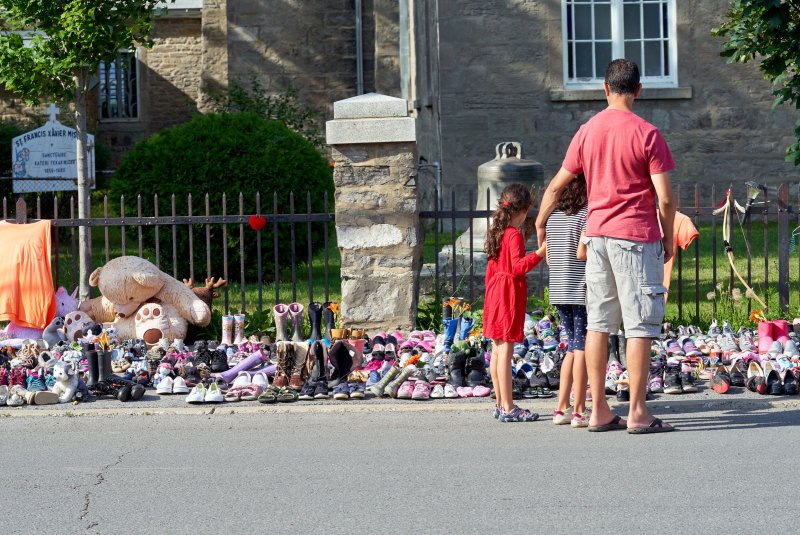A father and his children walk near a tribute in front of the Catholic St-Francis Xavier Mission, for the 215 indigenous children buried in an unmarked mass grave on the grounds of the former Kamloops Indian Residential School in July 2021. File Photo by Andre Pichette/EPA-EFE
Jan. 4 (UPI) -- The Canadian government has reached a $40 billion agreement to settle lawsuits alleging that the on-reserve child welfare system received discriminatory funding and that First Nations children were unnecessarily taken from their homes, officials announced on Tuesday.
The agreement in principle, meaning that the groundwork has been decided but final details have not been made, was reached on Dec. 31 and is expected to be negotiated before March 31, according to a press release from Indigenous Services Canada.
The decision means the end is approaching for a process started in 2007, when two nonprofit organizations filed a complaint under the Canadian Human Rights Act alleging that the government was fighting jurisdictional disputes over the payment for services provided to First Nations children rather than prioritizing their needs.
The Canadian Human Rights Tribunal found in a 2016 decision that the federal government had underfunded the welfare system and later ordered in 2019 that Ottawa pay $40,000 to each child and their primary guardian who were a part of the system.
A federal court upheld the tribunal's decision last year and the government then appealed, but the appeal was set aside while the parties worked toward the agreement that was reached Tuesday.
The agreement earmarks $20 billion in compensation to be given to First Nations children, and their parents and caregivers, who were removed from their homes between April 1, 1991 and March 31, 2022.
"The Canadian Human Rights Tribunal found that the current program contains a perverse incentive for child welfare agencies to apprehend children," the Assembly of First Nations said in a statement.
"Specifically, a child welfare agency would not be reimbursed for expenses incurred to provide services, unless the child was removed from their home and placed into state care."
It also sets aside $20 billion to reform the First Nations Child and Family Services program, including support for young First Nations adults aging out of the system and prevention services, as well as new on-reserve housing.
"First Nations children thrive when they can stay with their families, in their communities, surrounded by their culture," Patty Hajdu, Canada's Minister of Indigenous Services, said in a statement.
"No compensation amount can make up for the trauma people have experienced, but these Agreements-in-Principle acknowledge to survivors and their families the harm and pain caused by the discrimination in funding and services."
According to the Assembly of First Nations, the exact number of children who will be compensated is not yet known but independent third-party experts estimated that more than 200,000 First Nations children were impacted by the program and would be eligible to receive funds.
If a final agreement is reached and approved, funds could be distributed by the end of 2022 or early 2023.















